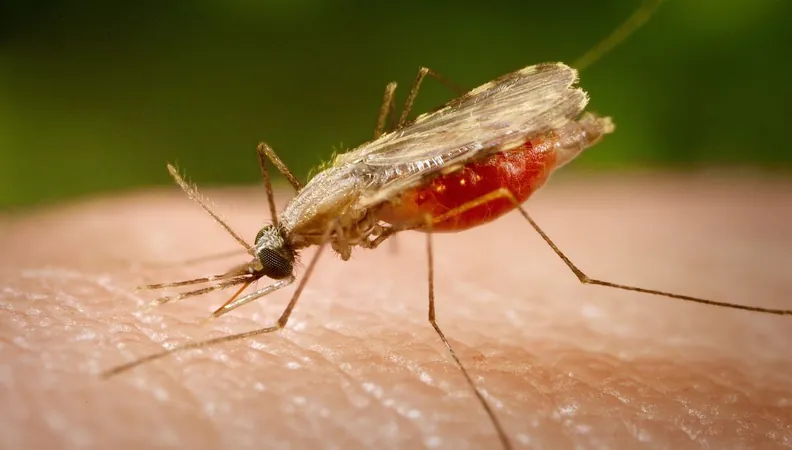
Revolutionary Drug Turns Human Blood into Mosquito Poison! Could This Be the Key to Ending Malaria?
2025-04-04
Author: Arjun
Groundbreaking Discovery
In a groundbreaking study, researchers have discovered that nitisinone, a drug originally approved for rare genetic disorders, could transform human blood into a lethal substance for malaria-carrying mosquitoes. This startling revelation could provide a new avenue in the fight against malaria, a disease that continues to claim hundreds of thousands of lives each year.
What is Nitisinone?
Nitisinone is currently prescribed for two genetic conditions: tyrosinemia type 1 and alkaptonuria. Its primary function is to inhibit an enzyme called 4-hydroxyphenylpyruvate dioxygenase (HPPD), which plays a crucial role in the detoxification pathway of the amino acid tyrosine. By blocking HPPD, nitisinone effectively prevents toxic byproducts from accumulating in patients suffering from these conditions.
Research Findings
What researchers have recently uncovered is that mosquitoes from the Anopheles genus, the primary vectors of the malaria-causing Plasmodium parasites, also rely on HPPD to digest their blood meals. According to a study published on March 26 in Science Translational Medicine, nitisinone-treated human blood could become a death trap for these blood-sucking pests. The drug disrupts the detoxification process in mosquitoes, leading to their demise after feeding on treated blood.
Need for Innovative Strategies
As mosquito populations become increasingly resistant to conventional insecticides, new strategies for malaria control are desperately needed. The findings from this research open up the possibility of repurposing nitisinone as an innovative malaria control method. However, it is essential to note that this approach is not a cure for malaria. Alvaro Acosta-Serrano, a co-author of the study and a professor at the University of Notre Dame, emphasized that while the drug could significantly reduce mosquito populations and transmission rates, it will not prevent existing infections.
Effective Dosage
The study involved meticulously designed lab experiments to ascertain the minimum effective concentration of nitisinone required to kill Anopheles mosquitoes. Ultimately, researchers determined that a single dose of nitisinone—around 0.1 milligrams per kilogram of body weight—could render human blood lethal to mosquitoes for approximately five days. In contrast, the common antiparasitic drug, ivermectin, showed no mosquito mortality with any single dose.
Experimental Results
Further experiments revealed that mosquitoes fed on blood samples from patients who took nitisinone regularly died within just 12 hours, while those fed untreated blood survived unscathed. The implications of these findings are profound, suggesting that nitisinone could be a viable tool in malaria prevention efforts.
Challenges Ahead
However, numerous challenges lie ahead before nitisinone can be utilized for this purpose. Researchers must evaluate the drug’s safety for healthy individuals, especially in malaria-endemic regions. If increasingly utilized as a preventive measure, nitisinone will need to demonstrate minimal side effects to be acceptable for general administration.
Future Considerations
Moreover, understanding how nitisinone interacts with traditional antimalarial treatments is crucial, as these will still be necessary for treating those infected with malaria. The mechanisms behind the lethal effect of nitisinone on blood-feeding insects must also be elucidated to assess potential mosquito resistance to the drug in the future.
Conclusion
As researchers continue their investigations, the vision of a malaria-free world inches closer, with stunning possibilities for innovation just on the horizon. Could nitisinone be the game-changer we need in the global battle against malaria? Only time and research will tell. Stay tuned for updates on this promising, potentially life-saving development!


 Brasil (PT)
Brasil (PT)
 Canada (EN)
Canada (EN)
 Chile (ES)
Chile (ES)
 Česko (CS)
Česko (CS)
 대한민국 (KO)
대한민국 (KO)
 España (ES)
España (ES)
 France (FR)
France (FR)
 Hong Kong (EN)
Hong Kong (EN)
 Italia (IT)
Italia (IT)
 日本 (JA)
日本 (JA)
 Magyarország (HU)
Magyarország (HU)
 Norge (NO)
Norge (NO)
 Polska (PL)
Polska (PL)
 Schweiz (DE)
Schweiz (DE)
 Singapore (EN)
Singapore (EN)
 Sverige (SV)
Sverige (SV)
 Suomi (FI)
Suomi (FI)
 Türkiye (TR)
Türkiye (TR)
 الإمارات العربية المتحدة (AR)
الإمارات العربية المتحدة (AR)